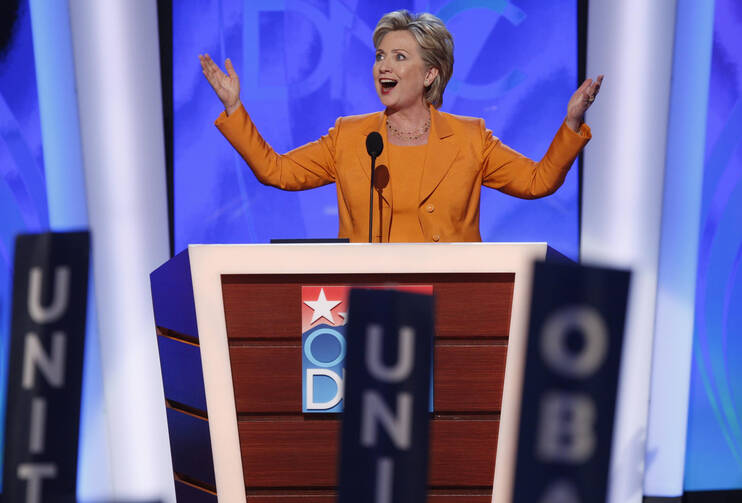I hope everyone enjoyed the long weekend made possible by our commemoration of national leaders widely considered weak and ineffectual while in office.
I’m referring to Presidents’ Day, or Green Lantern Day, as it should be known among political scientists frustrated by those insisting that a president can do anything with enough willpower. (RealClearPolitics’ Sean Trende explains the theory, popularized by Brendan Nyhan.) President Obama can take a tiny bit of comfort in the example of Dwight Eisenhower, mocked in the 1950s as a weak president but now respected as a steady hand during the first full decade of large-scale nuclear weaponry. If Obama lives to be 100, he might witness a similar change in opinion.
Our unrealistic expectation of presidents is clear to anyone who’s lived through enough of them. Even sillier is when a variation of the Green Lantern theory is applied to people running for president. Will Hillary Clinton save or destroy the Democratic Party? Can Paul Ryan single-handedly transform, or at least “rebrand,” the GOP as the party concerned with getting people out of poverty?
I have no complaints about presidential campaigns starting earlier and earlier each time, because they don’t. As long as we have a system with presidential term limits and no official opposition leader, there’s going to be constant speculation about future nominees as soon as an election is over. But it can be tempting to attach too much importance to a person who will have limited power over the long-term direction of the Democratic or Republican Party.
Jimmy Carter seemed like a transformational candidate in 1976, representing a Southern populism that appealed to both white and black voters, but he couldn’t steer the Democratic Party away from its post-Watergate move toward Northern, suburban liberalism, and his coalition collapsed before Ronald Reagan in 1980. Similarly, George W. Bush’s “compassionate conservatism” (now echoed by Ryan) didn’t change the identification of the Republican Party as increasingly right-wing. Losing nominees have certainly hurt down-ticket candidates, but the Republicans bounced back quickly in congressional elections after the Barry Goldwater debacle of 1964, and the Democrats recovered after George McGovern was wiped out in 1972. Now that the electorate is better “sorted,” or aligned with one or the other party, it’s even less likely that a nominee can campaign hard enough to change the public perception of his or her party.
So there’s reason to be skeptical about presidential candidates making or breaking a major political party. On Saturday, the Washington Post’s Dan Balz and Philip Rucker wrote about “simmering tensions between the [Democratic Party] establishment and a newly energized populist wing” and concluded with a look at the 2016 race:
For Democrats who could lead the party in the future, the challenge will be to articulate a new populist direction without denigrating the Obama record or abandoning the contributions of Bill Clinton. At the moment, Hillary Clinton is an overwhelming front-runner, and Democrats expect that, should she decide to run, she would define their party for the post-Obama era.
As the nominee, the authors add, “Clinton would be under pressure to articulate a fresh economic vision to a party in which there is growing demand for a more populist edge to the rhetoric.”
If there’s voter demand for more populism, Clinton can articulate it well enough. I don’t think she’ll “define” the party as much as she adapts to whatever vision does well in this fall’s midterm elections. And that’s not a criticism. As president, she would have to work with congressional Democrats, and there’s no point trying to craft a message they want no part of. She’s not going to campaign in 2016 by calling out other Democratic candidates for being insufficiently tough on banks and on Wall Street. Maybe Elizabeth Warren would be a little more confrontational, but I don’t think party leaders in Massachusetts cleared the field for her U.S. Senate run because she lectured them on economic policy. They thought she was electable because the state’s electorate was already receptive to her message.
Clinton, Warren, or any of the dozen or so plausible Republican candidates will have to work with the political party they’re given. Any lasting change to either party’s philosophy will have to start with lower-level elections, including those for local Democratic or Republican committees. This is not the same as grass-roots activism, which may include voter registration and getting people to the polls on Election Day; it’s got to involve capturing seats in city councils and lobbying state legislators. The religious right did it in the 1980s and 1990, and economic libertarians are doing it now through organizations like the America Legislative Exchange Council (ALEC).
The shortcut of advancing an agenda, populist or otherwise, through a sympathetic presidential candidate never works by itself. Clinton, Ryan, or whoever advances to November in 2016 is not going to transform a political party in a matter of months. If there’s a “fresh economic vision” in the making, look for it to develop this fall.
UPDATE: Matthew Ygelsias argues that the Democratic Party is not seriously divided by degrees of economic populism, but by education reform (or, to put it simply, degrees of support for teachers' unions). I agree that this may be harder for Clinton and any Democratic rivals to fudge than banking regulation.








